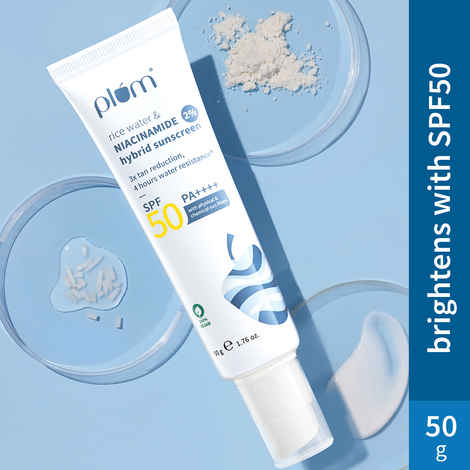
Highlights
WHAT IS IT?
Hybrid Face Sunscreen with 4 UV filters
FEATURES
SPF 50 PA+++ protection, hybrid UV-filters (physical and chemical), brightening niacinamide, blemish-clearing rice water, no white cast, lightweight, non-sticky, dermatologically tested
BEST FOR
normal
CHECKS
Does not contain parabens
Who Is It For?
Women & Men Of All AgesWhat Does It Help With?
Protects Against Uva & Uvb Rays Photoaging Tanning Brightens Skin Clears BlemishesBudget
Affordable (under $30)How To Use
Which routine should it be used in?
Instructions:
Key Information










What Plum Says
Product Description:
Plum 2 Niacinamide & Rice Water Hybrid Sunscreen is a powerpacked SPF 50 PA +++ Sunscreen that goes beyond just sun protection. It is powerpacked with brightening Niacinamide blemishclearing Rice Water and 4 effective hybrid UV filters that offer layers of protection from harmful UVA & UVB rays. It contains hybrid filters which is a combination of physical and chemical UV filters.
About the Brand:
Ingredients Overview
Ingredients List
Aqua, Ethylhexyl Methoxycinnamate, Butyl Methoxydibenzoylmethane, Benzophenone-3, Phospholipids, 1,3 Butylene glycol, Propanediol, Niacinamide, Glycerin, Titanium Dioxide, Silica, Dimethicone, Rice Ferment Filtrate, Oryza Sativa (Rice) Extract, Benzyl Alcohol, Hydroxyacetophenone, Caprylyl Glycol, Ammonium Acryloyldimethyltaurate/VP Copolymer, Sodium Polyacryloyldimethyl Taurate, D-Panthenol, Sodium Benzoate, Potassium Sorbate, Sodium Gluconate
Key Ingredients
niacinamide, rice-water, hybrid-uv-filters
Ingredients Details
Ammonium Acryloyldimethyltaurate/vp Copolymer
Benzophenone-3
Benzyl Alcohol
Butyl Methoxydibenzoylmethane



